#julius ii
Text

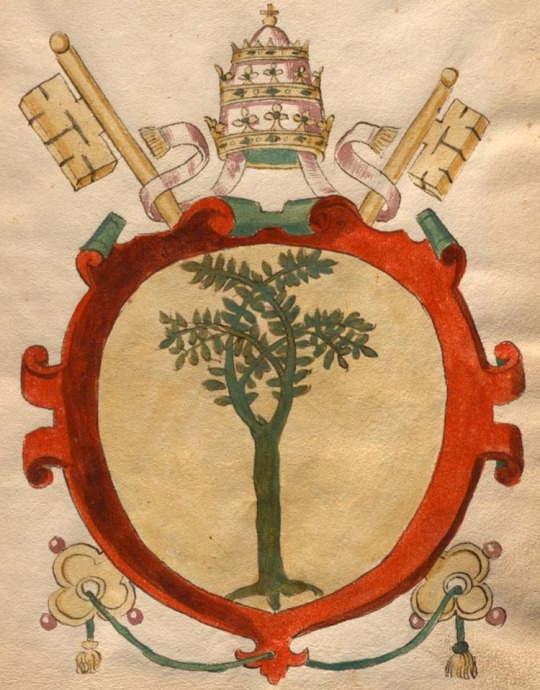
Coat of Arms of Pope Julius II
#pope julius ii#crest#arms#julius ii#heraldry#coat of arms#blazon#papal#pope#art#oak tree#history#della revere#house of della revere#italy#italian#noble#nobility#europe#european#rome#vatican#christianity#christian#renaissance#papal states#italian wars#warrior#giuliano della rovere#iulius ii
43 notes
·
View notes
Text

Julius der Sekundäre und/ oder Folgende
Sekundär ist, was folgt, denn was folgt ist ohnehin sekundär. In eine Welt, die nicht auf darauf beharrt, prima causa gesetzt und bestimmt zu sein, könnte sich der folgende Julius, nämlich der von Walburgs Staatstafel, pudelwohl fühlen. Das erweitert nämlich eventuell die Freiheiten, die Spiel- und Denkräume. Lange nach dem folgenden Julius, also dem, der auf Wsrburgs Staatstafeln auftaucht, kreist durch die Literaturen und um Berater herum ein sogenannter kybernetischer Imperativ: Handele stets so, dass die Anzahl deiner Möglichkeiten sich erhöhen. Darauf zu verzichten, alle seine Handlungen an einem Grund festzumachen, könnte dabei helfen.
Julius II. folgt Julius I., aber. nicht nur dem, den Julius I. ist weder das einzige noch unmittelbare Vorbild von Julius II. Er folgt ihm, aber nicht ganz. Julius II. ist einer der Päpste, die an einer Phantasie gearbeitet haben, zu der u.a. auch die Konstantintische Schenkung und ihre Urkunde gehört. Ein Vorbild ist auch ein Caesar, nämlich Julius Caesar.
2 notes
·
View notes
Text

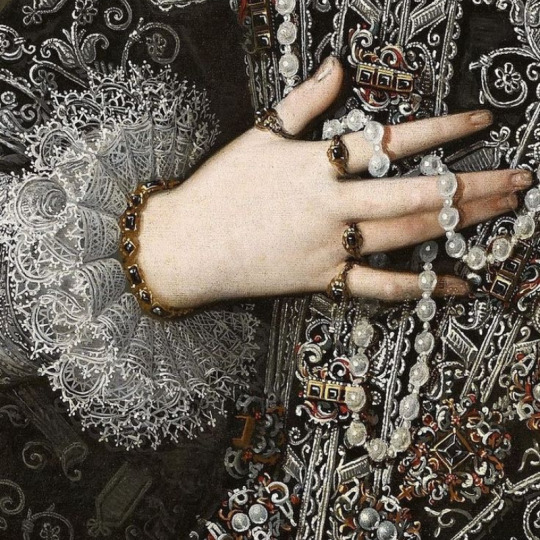
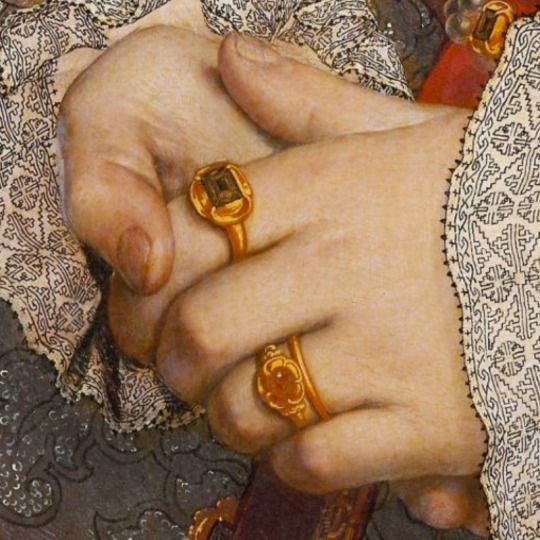
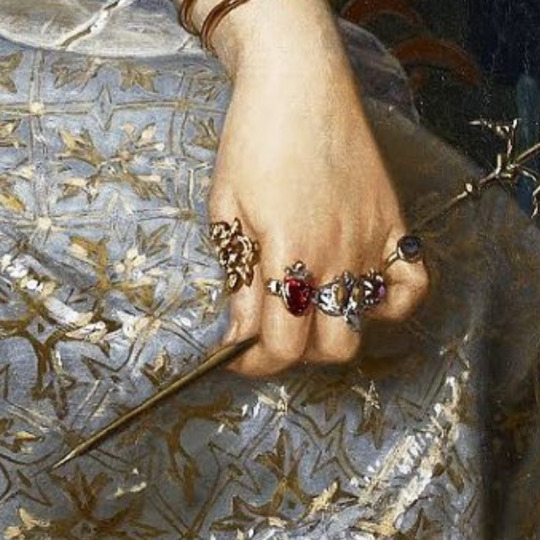
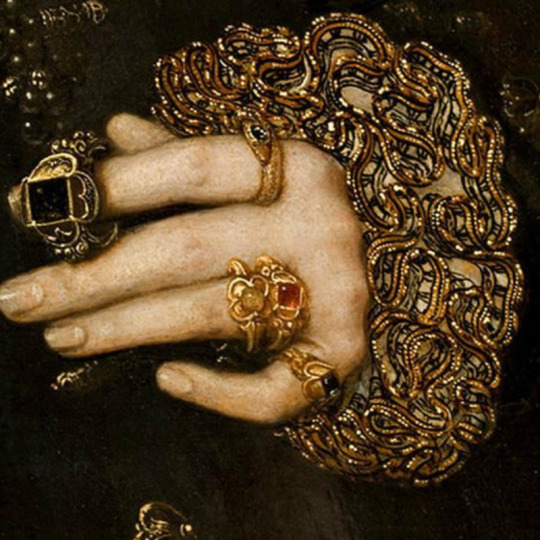

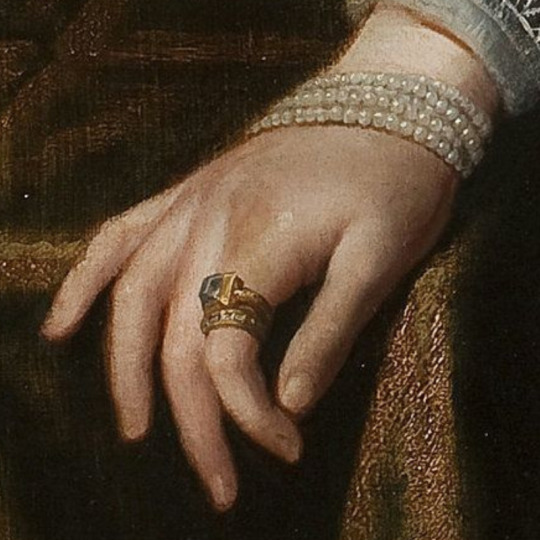

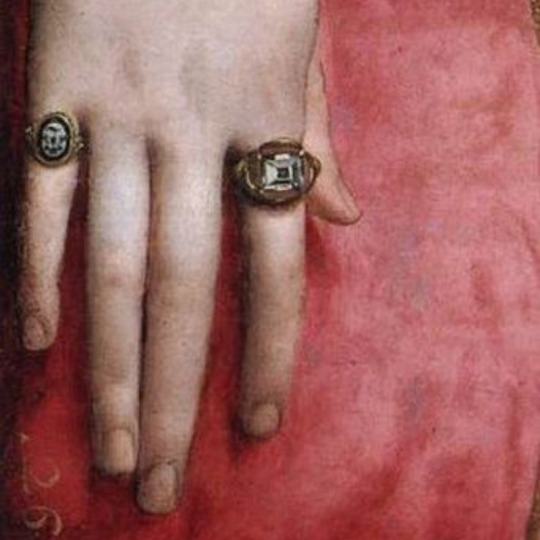

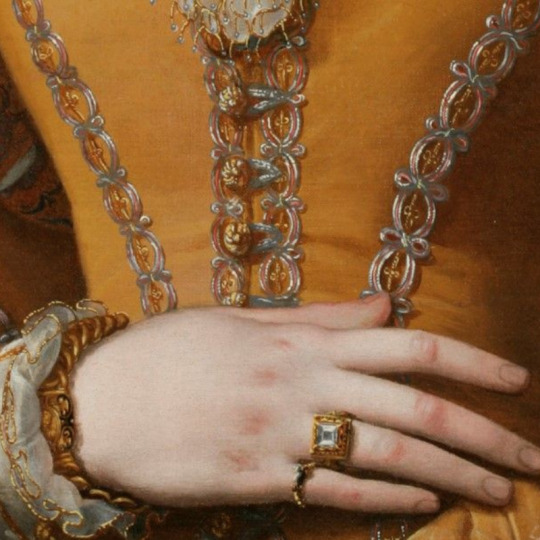
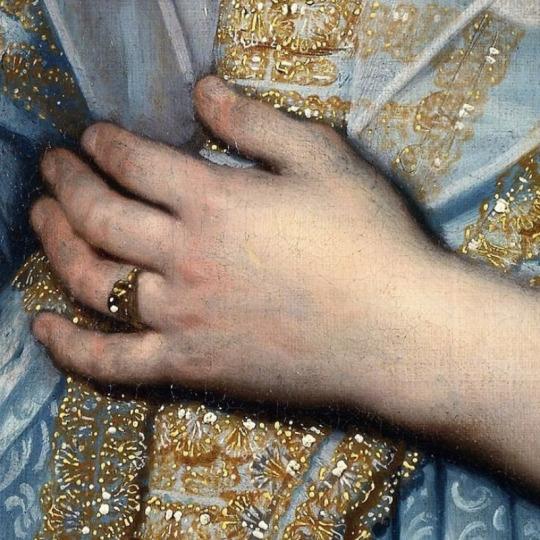
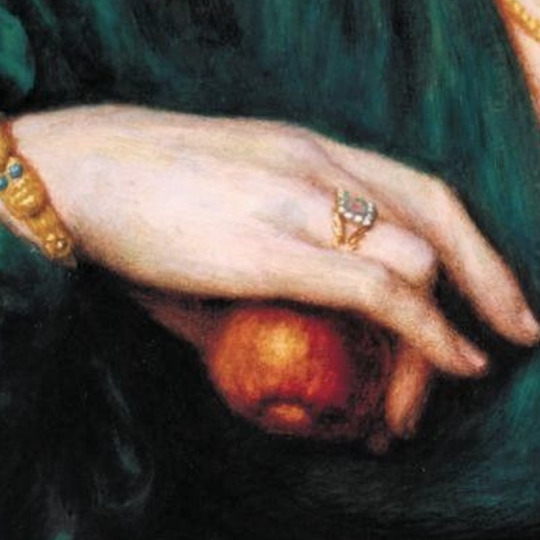
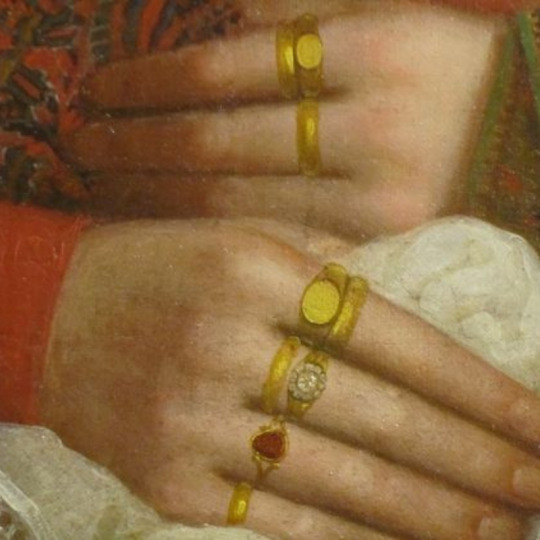
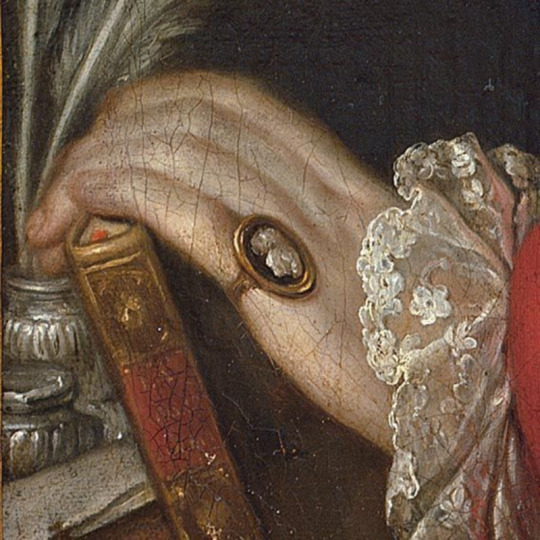
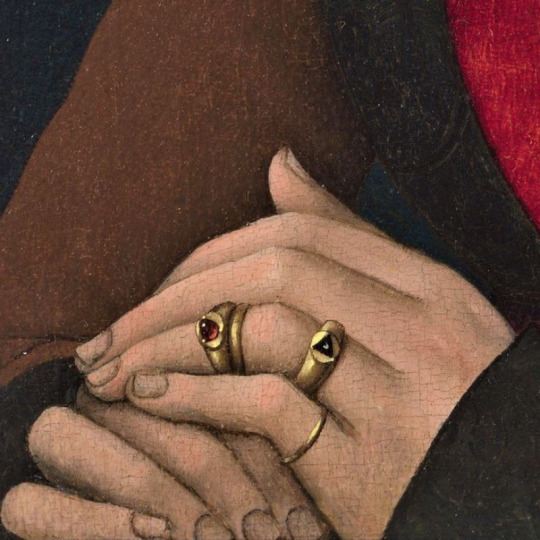
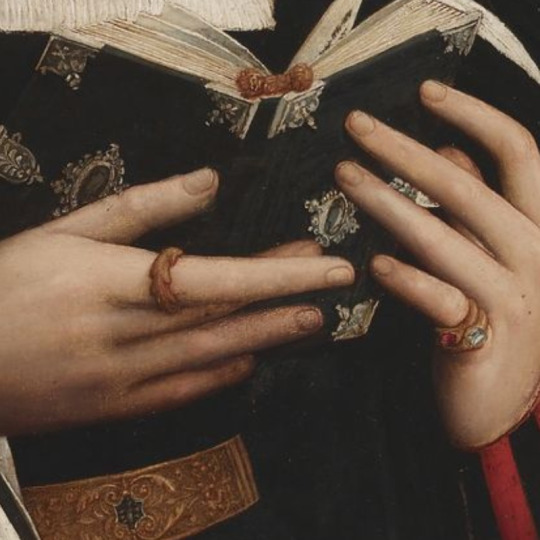
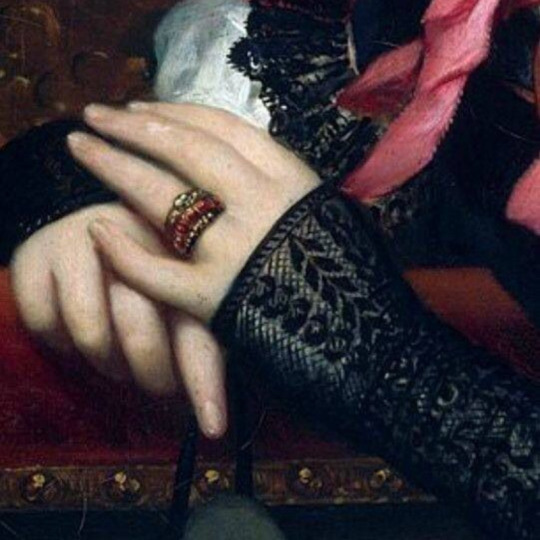

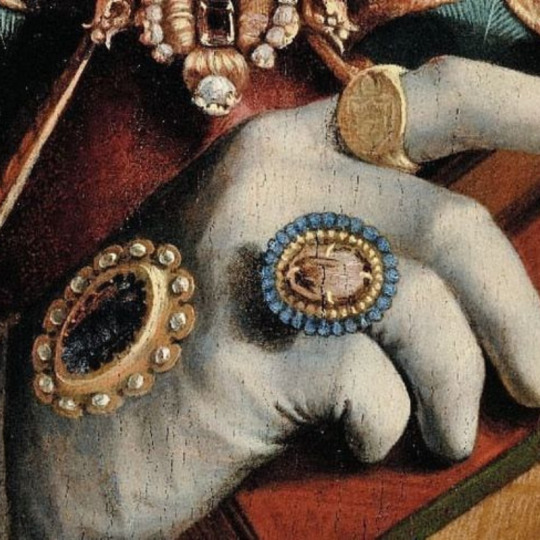
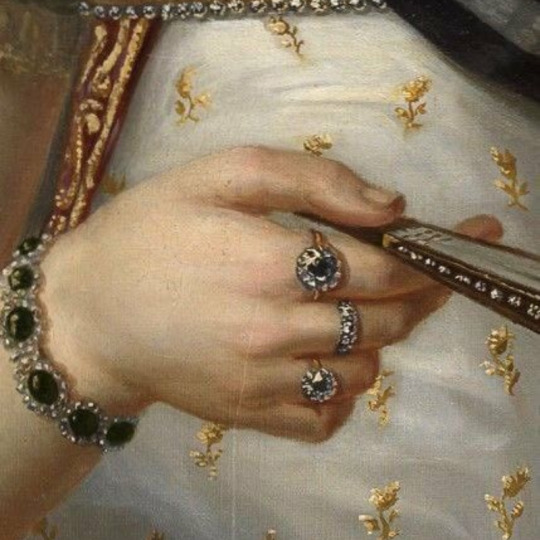
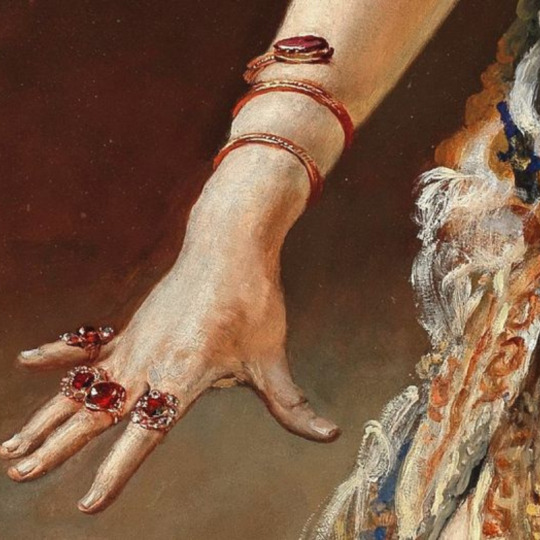
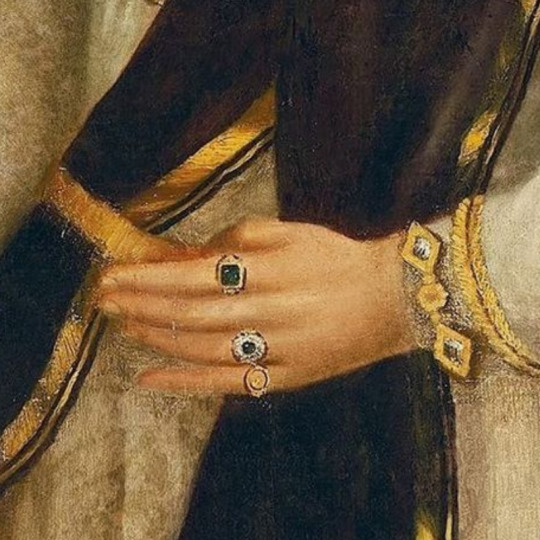

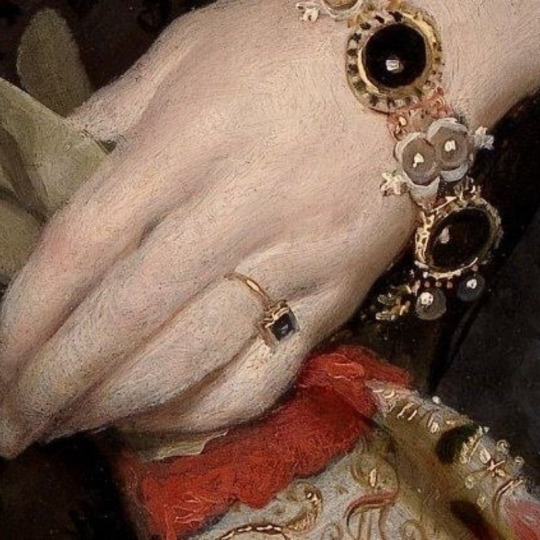
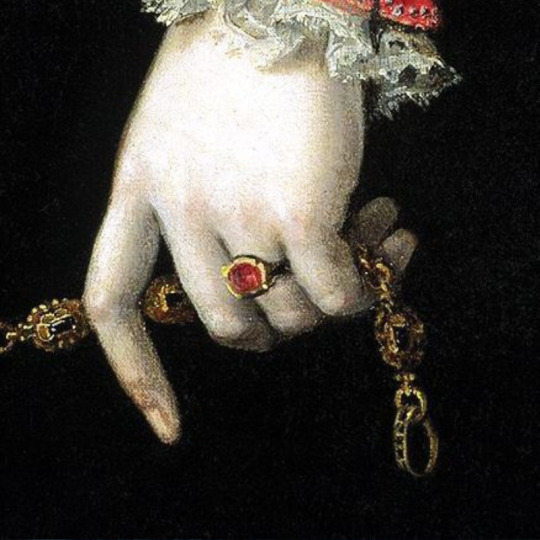
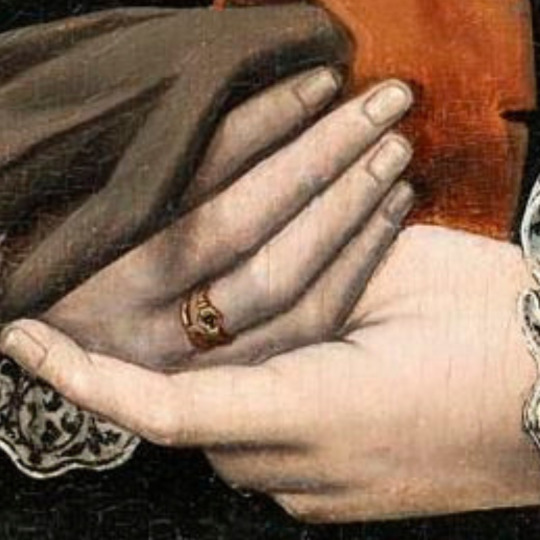
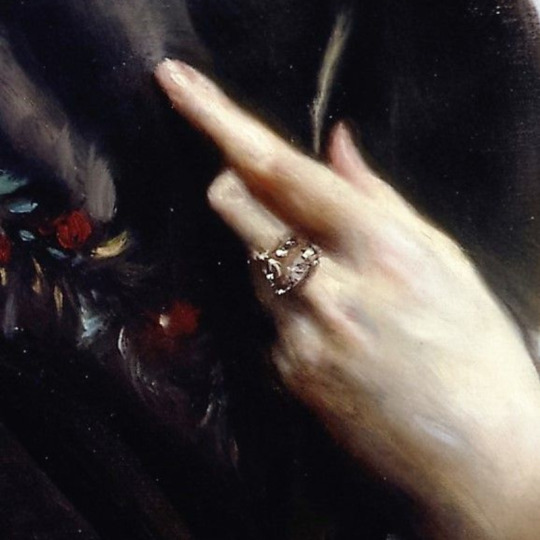
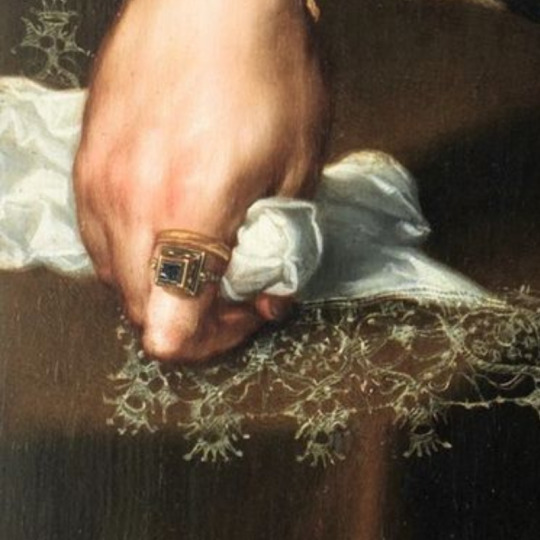

rings + art
#isabel de bourbon by rodrigo de villandrando#i cannot find the artist#portrait of jane seymour by hans holbein the younger#the sorceress by georges merle#portrait of a young woman by nicolaes eliasz pickenoy#portrait of a man by jan gossaert#portrait of johanna martens by paulus moreelse#cant find artist but the portrait is of camilla martelli#eleanora di toledo by angolo bronzino#portrait of pope julius ii by raphael#young lady by alessandro allori#princess albert de broglie by jean auguste dominique ingres#monna pomona by dante gabriel rossetti#portrait of a young zaraysk merchant woman by unknown#portrait of tomas de iriarte by joaquin inza#cant find the artist of this one#female saint holding a book by amico aspertini#looked everywhere but couldn't find artist#can't find artist#painting by lorenzo lotto#maria josepha amalia by francisco lacoma y fontanet#salome by leopold schmutzler#cant find artist nor painting name#a man with a pansy and a skull by unknown#cant find artist or painting#painter is juan pantoja de la cruz#portrait of a lady by william scrots#painter is gustave jean jacquet#portrait of a woman by maybe marie schuurman#portrait of a lady by gortzius geldorp
2K notes
·
View notes
Text
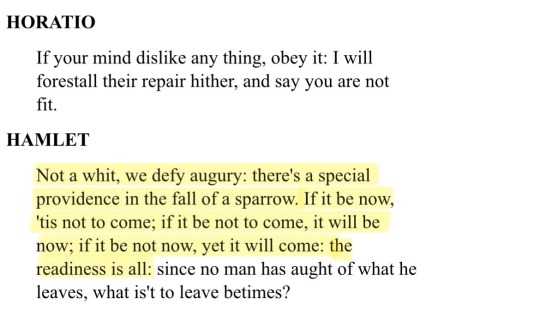
-
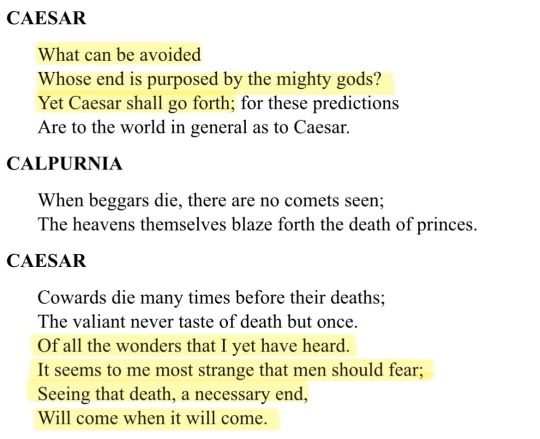
-

-
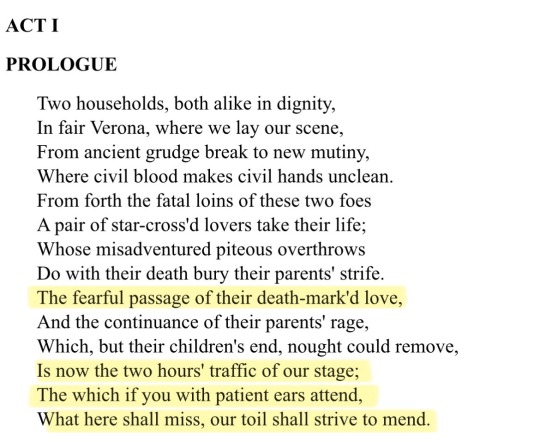
-
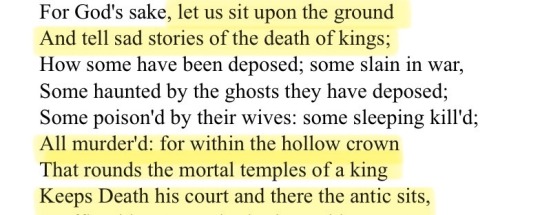
-

“This was always going to happen/She’s been dead since the beginning” in the tragedies of William Shakespeare
+ Bonus - Rosencrantz and Guildenstern Are Dead, Tom Stoppard:

#Shakespeare#Hamlet#Romeo and Juliet#Julius Caesar#Macbeth#Richard II#(technically not a tragedy SORRY)#Othello and Lear are also HEAVILY steeped in this but the quotes aren’t quite as punchy as these#alternate title of post: Shakespeare was really REALLY into the theme of predestination huh…#the inevitability of the stage tragedy#you are killing them by continuing to watch
222 notes
·
View notes
Text

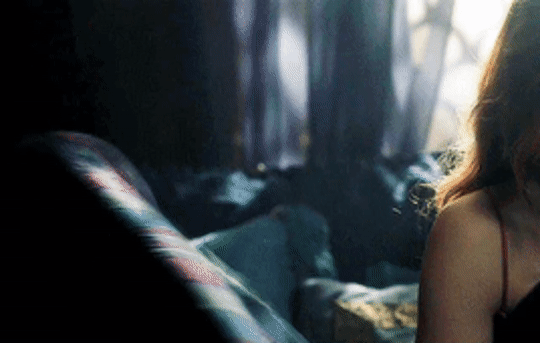
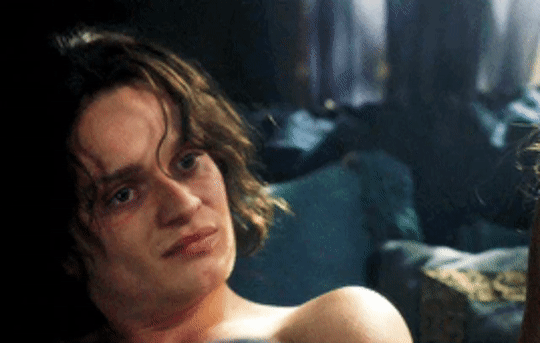
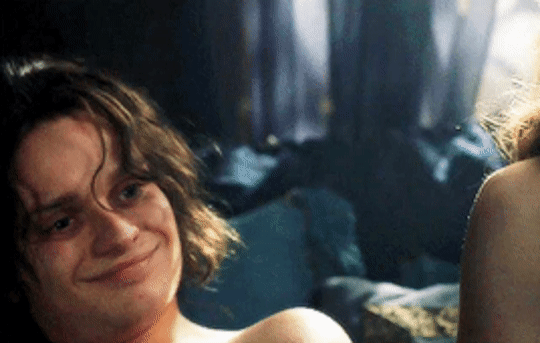
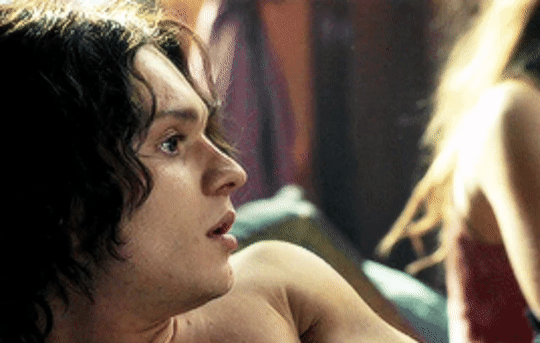
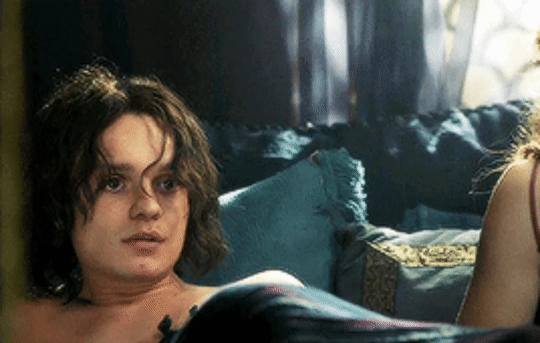
𝐓𝐎𝐌 𝐆𝐋𝐘𝐍𝐍-𝐂𝐀𝐑𝐍𝐄𝐘 𝐚𝐬 𝐲𝐨𝐮𝐧𝐠 𝐆𝐚𝐢𝐮𝐬 𝐉𝐮𝐥𝐢𝐮𝐬 𝐂𝐚𝐞𝐬𝐚𝐫 𝐎𝐜𝐭𝐚𝐯𝐢𝐚𝐧𝐮𝐬 𝐢𝐧 𝐃𝐎𝐌𝐈𝐍𝐀
#aegon ii targaryen#aegon targaryen#tom glynn carney#house of the dragon#Hotd#gaius julius caesar#c: Gaius Julius Caesar#a: tom glynn-carney
921 notes
·
View notes
Text
memes for fowlfest day 1


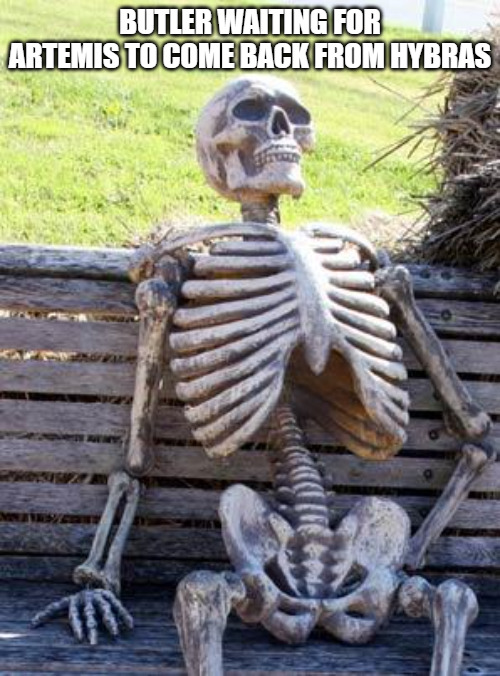
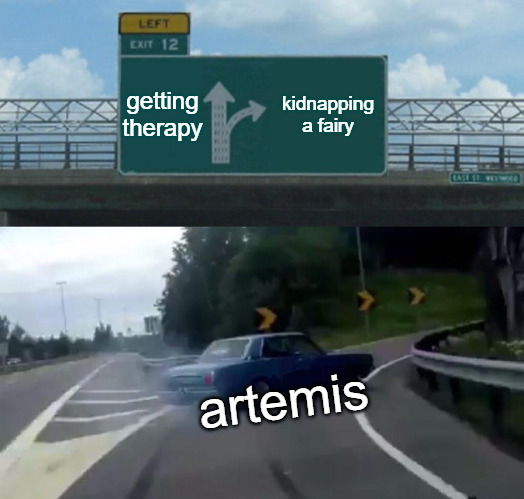
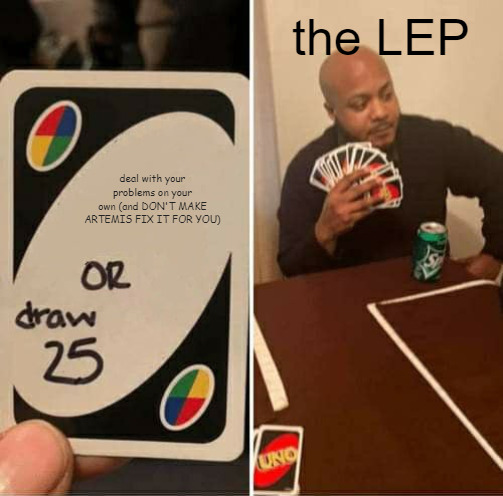
#artemis fowl#artemis fowl ii#artemis fowl books#af#fowldom#foaly#fowl fest#fowlfest#fowlfest2023#fowl fest 2023#memes#holly short#domovoi butler#julius root#the council
203 notes
·
View notes
Text
Young Gaius Julius Caesar x Reader (Eros)
Warnings: Innacurate history, Injury, Blood, P in V sex, +18

Gaius woke up in the middle of nowhere, from his calcullations, he assumed he was in Greece... The battle had been lost, but he would try again and again until he avenged his father Caesar, and then he would accomplish so much more. He wouldn't rest until he was Emperor.
He suddenly felt the warm liquid on his forehead and realized he was bleeding so he rested upon a tree, trying to gain strenght and come up with a plan.
-
She went out to pick up some berries, the sun was glowing in the sky and the day looked as peaceful as any other. She was walking around when she saw him. Eros. He was absolutely beautiful, he was dressed as a roman soldier, but his beauty was so, that she thought he must be divine. She hid behind a tree, she thought if he saw her, he would dissapear.
Then she saw the snake going closer to the man. She wanted to tell him, but if he was Eros, he was immortal, it surely wouldn't be a problem... But then the snake bite him and he winced in pain, he steadfastly held his sword and cut the snake in two, but the poison was already in his bloodstream.
She realized he was a human and ran to help him.
-
-Fuck… fuck...
The poison hurt, his leg felt on fire. He thought he was allucinating when he saw her. Suddenly, in front of him a goddess to take him to other realm. Her long hair traced all the way to her waist as the fabric of her white dress clung desperately at her every curve.
-Allow me... I can help...- She spoke sweetly.
He murmured a soft yes and the lady fell to her knees and started sucking the poison. Her hands on his leg and her mouth on his thight, he thought it must be a fever dream.
She sucked the poison and drank the blood, as she knew such thing could not harm her.
Gaius couldn't help himself and started caressing her soft hair as she drank him, his leg starting to feel better, the burning pain turning into burning pleasure as she drank more and more.
She suddenly stopped, sure he was no longer in danger.
-Thank you - He said as he caressed her face and cleaned his blood of her plump lips with his fingers.
-It's alright, you'll be well in a few days...- She smiled at him.
She help him stand and they walked to her place. It was small, cozy and near the sea.
She poured a glass of wine for Gaius and he drank.
-
A few days passed as they layed on the beach, drink wine and talked to eachother about things they wouldn't tell anyone else.
He knew he would have to return to Rome, but staying with her was all he wanted.
-
-May I take you to Rome? - He whispered behind her ear.
- I'll go anywhere you want me to. -She smiled.
Gaius kissed her hungrily as he had been wanting to do since he first saw her. She kissed him back, parting her lips as to allow his tongue. Soon, their clothes were on the floor and her hips were around his.
He put her on the table and started sucking her right nipple, she whimpered as he sucked and lapped at each of her breast. Then, he took her, using the table as leverage, he pounded into her. Both of them kissing away their moans as they pursued their peak again and again.
#young gaius x reader#tom glynn carney#tgc#tgc x reader#aegon ii x reader#aegon ii targaryen#gaius julius caesar#gaius julius caesar x reader#aegon smut#young gaius#mine
326 notes
·
View notes
Text

Woah no way?? People (completely unprompted /s) want to hear my trans Shakespeare headcanons?? You bet I can do that.
I’ve done this once before:
But I have even more thoughts now!!
In no particular order:
Puck (A Midsummer Night’s Dream): Every single pronoun possible. He/she/they/it + all of the neopronouns and xenopronouns that exist currently or will ever exist. Fairy gender is always weird but Puck’s is extra weird.
Oberon (A Midsummer Night’s Dream): Fairy gender. Probably he/they/it?
Titania (A Midsummer Night’s Dream): More fairy gender. She/they/it?
Titania’s fairy attendants (Midsummer): Get a hat and fill it with various pronouns and draw them out at random for the fairies.
Benedick (Much Ado About Nothing): Could go either way, but I really like the idea of transfemme Benedick. Or he/him lesbian Benedick.
Beatrice (Much Ado About Nothing): The she/they to end all she/theys
Viola/Cesario (Twelfth Night): Could be trans in literally any direction. I made a post about this too at some point. My suggestion is all of the directions: they/she/he
Sebastian (Twelfth Night): He/him, transmasc. I also made a post about this at some point.
Feste (Twelfth Night): I saw a great she/her Feste last summer.
Orsino (Twelfth Night): Specifically the himbo variety of he/they
Margaret of Anjou (Henry VI trilogy and Richard III): If I ever play Margaret, I will use she/they pronouns.
Catesby (Richard III): Just played Catesby with she/her pronouns and it worked!
Richard II (Richard II): Tell me Richard isn’t the most they/he or he/they guy alive (or… dead).
Hal (1 Henry IV-Henry V): Saw Hal played with she/they pronouns last summer and it was great. Could also see he/they Hal. Very nonbinary vibe overall. I personally believe that going by Hal rather than Henry for two whole plays is their way of pulling the “going by the first letter of what my name used to be instead of picking a name from scratch” nonbinary trick. He probably pretends to be cis after his dad dies and he becomes king—one more element of Hal’s lifelong identity crisis.
Hotspur/Harry Percy Jr. (Richard II & 1 Henry IV): He/they in denial.
Kate Percy (1 & 2 Henry IV): She/they, not in denial. (Also Katespur should be bi4bi)
Ned Poins (1 & 2 Henry IV): Transmasc Ned Poins?? Maybe he doesn’t actually have a sister and Nell is just his deadname. Ned Poins’ failed scheme to flirt with Hal.
Romeo (Romeo & Juliet): he/they (t4t R&J!!!)
Juliet (Romeo & Juliet): she/they (t4t R&J!!!)
Mercutio (Romeo & Juliet): they/he(/it?). Vibes alone. Look at them. Just look.
Nurse (Romeo & Juliet): she/her, transfemme!
Cassius (Julius Caesar): Would love to see a they/them Cassius
Hamlet (Hamlet): he/they. I’ve made multiple posts about this theory and I still love it.
Ophelia (Hamlet): she/they. As she should.
Laertes (Hamlet): she/him and NOT just because Laertes used she/her pronouns the first time I saw this play.
Rosencrantz (Hamlet): he/they/she. Vibes. Sometimes goes by Ros/Rose. Probably genderfluid.
Malcolm (Macbeth): they/he or they/them. Also vibes.
Lady Macbeth (Macbeth): stolen straight from my last post because this is still my HC: she/they; would insult you for “having pronouns in your bio” and then turn around and punch you in the face for using their pronouns incorrectly.
Angus (Macbeth): she/her, transfemme. (t4t Ross/Angus. I will die on this hill… Dunsinane Hill.)
Ross (Macbeth): he/him, transmasc
Caithness (Macbeth): she/they lesbian
Mark Antony (Julius Caesar and Antony & Cleopatra): I would not bat an eye at he/they Mark Antony
Edmund (King Lear): they/he, nonbinary, sexiest man (/gn) alive.
Edgar (King Lear): he/him. Transmasc Edgar is slowly becoming canon To Me.
Cordelia (King Lear): she/her, transfemme.
Goneril (King Lear): she/they. I would let them kill me.
Coriolanus (Coriolanus): transmasc OR transfemme Coriolanus is!!!! The butterfly/metamorphosis motif! Name changes during canon! Discomfort with scars/body! Lack of autonomy granted by society! This is THE transgender play. (Other than Twelfth Night)
Imogen (Cymbeline): Tell me she doesn’t want to be a she/they so bad.
Florizel (The Winter’s Tale): he/they(/she?). Literally just a vibe. I have a pet rock named Florizel.
Perdita (The Winter’s Tale): she/they. I also have a pet rock named Perdita.
Ariel (The Tempest): Similar to Puck, probably they/she/he? Even my conservative English prof consistently rotates between she/her and he/him for Ariel (possibly not intentionally? I’m not convinced he knows what her canon pronouns are.)
Ferdinand (The Tempest): she/they. PLEASE give me transfemme Ferdinand. PLEASE let Miranda realize she’s a lesbian during canon.
Miranda (The Tempest): she/they. Ariel taught them about the existence of she/they pronouns and she immediately started using them.
So in other words… every Shakespeare character should be trans, actually.
#ohhhh this is a LOT of plays to tag…#first of all:#trans#shakespeare#a midsummer nights dream#much ado about nothing#twelfth night#1 Henry VI#Richard III#Richard II#1 Henry IV#romeo & juliet#julius caesar#hamlet#macbeth#king lear#coriolanus#Cymbeline#the winter’s tale#the tempest#2 Henry IV#Henry V#2 Henry VI#3 Henry VI#I *think* I got them all!#MORE! TRANS! SHAKESPEARE!!!!#these plays SHOULD be genderqueer#honestly everything should be more genderqueer#of course I (your local she/they/he) am not biased at all
35 notes
·
View notes
Text
'David Tennant and Cush Jumbo walk into the Donmar Warehouse’s offices, above the theatre’s rehearsal rooms in Covent Garden, and sit down on a sofa, side by side. Tennant has that look his many fans will instantly be able to call to mind of being at once stressed – with a desperado gleam in his eye – yet mischievously engaged, which has to do with the intelligence he applies to everything, the niceness he directs at everyone. He is wearing a mustard-coloured jersey and could be mistaken for someone who has been swotting in a library (actually, he has been rehearsing a fight scene). If I am right in supposing him to be tense at this mid-rehearsals moment, I know – from having interviewed him before – that it is not his way to put himself first, that he will crack on and probably, while he’s at it, crack a joke or two to keep us all in good spirits. But some degree of tension is understandable for he and Jumbo are about to perform in a play that explores stress like no other – Macbeth – and must unriddle one of the most dramatic marriages in all of Shakespeare’s plays.
This is star billing of the starriest kind. Tennant, at 52, has more triumphs under his belt than you’d think possible in a single career (including Doctor Who, Broadchurch’s detective, the serial killer Dennis Nilsen in Des, and the father in There She Goes). Jumbo has been seen on US prime time in The Good Wife and The Good Fight and in ITV’s Vera. But what counts is that each is a Shakespeare virtuoso. Jumbo, who is now 38, won an Ian Charleson award in 2012 for her Rosalind in As You Like It and, in 2013, was nominated for an Olivier for her Mark Antony in Phyllida Lloyd’s all-female Julius Caesar. More recently, she starred as a yearningly embattled Hamlet at the Young Vic. A dynamo of an actor, she is described by the former New York Times theatre critic Ben Brantley as radiating “that unquantifiable force of hunger, drive, talent usually called star power”. Tennant, meanwhile, who has played Romeo, Lysander and Benedick for the RSC, went on to embody Hamlet and Richard II in performances that have become the stuff of legend.
Jumbo settles herself cross-legged on the sofa, relaxed in her own body, wearing a white T-shirt, dusky pink tracksuit bottoms, and modestly-sized gold hoop earrings. She looks as if she has come from an exercise class – and she has in one sense – no need to ask whether rehearsals, at this stage, are full-on. As we shake hello, she apologises for a hot hand and I for a cold one, having just come in from a sharp November morning. She is chirpy, friendly, waiting expectantly for questions – but what strikes me as I look at her is how her face in repose, at once dramatic and pensive, gives almost nothing away, like a page waiting to be written on.
Max Webster, the director, is setting the play in the modern day and Macbeth, a taut and ageless thriller, is especially friendly to this approach. I want to plunge straight in to cross-question the Macbeths. Supposing I were a marriage counsellor, what might they tell me – in confidence – about their alliance? Tennant is a step ahead: “There are two versions of the marriage, aren’t there? The one at the beginning and the fractured marriage later.” And he then makes me laugh by asking intently: “Are they sharing the murder with their therapist?”
He suggests Macbeth’s “reliance” on his wife is unusual and “not necessarily to be expected in medieval Scotland” (another excuse for the contemporary production): “I look to my wife for guidance: I don’t make a decision without her,” he explains. “We’ve been through some trauma which has induced an even stronger bond.” Jumbo agrees about the bond and spells out the trauma, reminding us the Macbeths have lost a child, but hesitates to play the game (I have suggested she talk about Lady Macbeth in the first person): “I want to get it right. I don’t want to get it wrong. I don’t know what to say… If I improv Lady Macbeth, it will feel disrespectful because you don’t know if what you’re saying on her behalf is true. And then you’re going to write what I say down and she [Lady Macbeth] is going to be: ‘Thanks, Cush, for f-ing talking about me that way.’” She emphasises that, as an actor, you must never judge your character, whatever crime they might have committed. And perhaps her resistance to straying from the text is partly as a writer herself (it was her play, Josephine and I, about the entertainer and activist Josephine Baker, that put her career into fast forward, opening off Broadway in 2015).
She stresses that the great problem with Lady Macbeth is that she has become a known quantity: “She is deeply ingrained in our culture. Everyone thinks they know who she is. Most people studied the play at school. I did – I hated it. It was so boring but that’s because Shakespeare’s plays aren’t meant to be read, they’re meant to be acted. People think they know Lady Macbeth as a type – the strong, controlling woman who pushed him to do it. She does things women shouldn’t do. The greatest misconception is that we have stopped seeing Lady Macbeth as a human being.”
For Tennant, too, keeping an open mind is essential: “What I’m finding most difficult is the variety of options. I thought I knew this play very well and that it was, unlike any other Shakespeare I can remember rehearsing, straightforward. But each time I come to a scene, it goes in a direction I wasn’t expecting.” He suggests that momentum is the play’s great asset: “It has such muscle to it, it powers along. Plot-wise, it’s more front-footed than any Shakespeare play I’ve done.” And is it ever difficult for him as Macbeth to subdue his instinctive comic talent? “Well, yes, that’s right, there are no gags! But actually, there are a couple of funny bits though I’d never intentionally inflict comedy on something that can’t take it. I hope I’m creating a rounded human being with moments of lightness, even in the bleakest times.” Jumbo adds: “Bleakness is funny at times”, and Tennant, quick as a flash, tops this: “Look at our government!” (He is an outspoken Labour supporter.) Later, when I ask what makes them angriest, he says: “Well, she [Suella Braverman]’s just been sacked so… I’m now slightly less angry than I was.” Jumbo nods agreement, adding that what makes her angriest is “unkindness”.
It is Tennant who then produces, with a flourish, the key question about the Macbeths: “Why do they decide to commit a crime? What is the fatal flaw that allows them to think that’s OK? I don’t know that they, as characters, would even know. Has the loss of a child destabilised their morality?” In preparation, Tennant and Jumbo have been researching post-traumatic stress disorder. “PTSD is a modern way of understanding something that’s always been there,” suggests Tennant – and the Macbeths are traumatised three times over by battle, bereavement and murder. “We’ve looked at postpartum psychosis as well,” Jumbo adds. They have been amazed at how the findings of modern experts “track within the play”. Tennant marvels aloud: “What can Shakespeare’s own research process have been?” Jumbo reminds him that Shakespeare, like the Macbeths, lost a child. She relishes the play’s “contemporary vibe which means it’s something my 14-year-old niece will want to see. Even though you know the ending, you don’t want it to go there. It’s exciting to play that as well as to watch it.”
A further exciting challenge is the show’s use of binaural technology (Gareth Fry, who worked on Complicité’s The Encounter, is sound designer). Each audience member will be given a set of headphones and be able to eavesdrop on the Macbeths. “The technology will mess with your neurons in a did-somebody-just-breathe-on-me way,” Jumbo explains. “You’ll feel as if you’re in a conversation with us, like listening to a podcast you love where you feel you’re sat with them having coffee.” Tennant adds: “What’s thrilling is that it makes things more naturalistic – we’re able to speak conversationally.”
Fast forward to opening night: how do they manage their time just before going on stage? Tennant says: “I dearly wish I had a set of failsafe strategies. I don’t find it straightforward. I’ve never been able to banish anxiety. It can be very problematic and part of the job is dealing with it. I squirrel myself away and tend to get quite quiet.” But at the Donmar, this will be tricky as backstage space is shared. Jumbo encourages him: “When I’ve played here before, I found the group dynamic helpful,” she says, but explains that her pre-show routine has changed since her career took off and she became a mother: “These days, I no longer have the luxury of saying: I’m going to do five hours of yoga before I go on. When I leave home at four in the afternoon, I might be thinking about whether I’ll hit traffic or, whether my kid’s stuff is ready for the next day. You get better at this, the more you do it. The main thing – which doesn’t sound that sexy – is to make sure to eat at the right time, something light, like soup, because when I’m nervous I get loads of acid and that does not make me feel good on stage. I have a cut-off point for eating and that timing has become a superstition in its own way.”
In 2020, Tennant and Jumbo co-starred in the compulsively watchable and disturbing Scottish mini-series Deadwater Fell for C4. How helpful is it to have worked together before? Tennant says it is “hugely” valuable when tackling something “intense and difficult” to be with someone you are “comfortable taking chances with”. Although actors cannot depend on this luxury: “Sometimes, you have to turn up the first day and go: ‘Ah, hello, nice to meet you, we’re going to be playing psychopathic Mr and Mrs Macbeth.’” And Jumbo adds: “I’ve been asked to do this play before and said no. You have to do it with the right person. I knew this would be fun because David is a laugh as well as being very hard-working.” He responds brightly with a non sequitur: “Wait till you see my knees in a kilt…” Are you seriously going to wear a kilt, I ask. “You’ll have to wait and see,” he laughs.
It is perhaps the kilt that triggers his next observation: “We’re an entirely Scottish company, apart from Cush,” he volunteers, suggesting that Macbeth’s choice of a non-Scottish wife brings new energy to the drama. He grew up in Paisley, the son of a Presbyterian minister, and remembers how, in his childhood, “whenever an English person arrived, you’d go “Oooh… from another worrrrld!”, and he reflects: “Someone from somewhere else gives you different energy.” And while on the Scottish theme, it is worth adding that Macbeth is the part that seems patiently to have been waiting for Tennant: “People keep saying: you must have done this play before? I don’t know if Italian Shakespeareans keep being asked if they have played Romeo…”
I tell them I remember puzzling, as a schoolgirl, over Macbeth’s line about “vaulting ambition, which o’erleaps itself and falls on th’other” – the gymnastic detail beyond me. Tennant suggests that what Macbeth has, more even than ambition, is hubris. But on ambition, he and Jumbo reveal themselves to be two of a kind. Tennant says: “Ambition is not a word I’d have understood as a child but I had an ambition to become an actor from tiny – from pre-school. I did not veer off from it, I was very focused. When I look at it now, that was wildly ambitious because there were no precedents or reasons for me to believe I could.”
“For me, same,” says Jumbo, “I don’t remember ever wanting to be anything else.” She grew up in south London, second of six children. Her father is Nigerian and was a stay-at-home dad, her mother is British and worked as a psychiatric nurse. “At four, I was an avid reader and mimicker. I got into lots of trouble at school for mimicking. My ambition was similar to David’s although, as a girl, the word ‘ambition’ has always been a bit dirty…” Tennant: “It certainly is to a Scottish Presbyterian.” “Yes,” she laughs, “perhaps I should have said Celts and Blacks… Girls grow up thinking they should be modest, right? But I had so much ambition. I knew there was more for me to do and that I could be good at doing it.”
And what were they like as teenagers – as, say, 14-year-olds? Tennant says: “Uncomfortable, plooky…” What’s plooky, Jumbo and I exclaim in unison. “A Scottish word for covered in spots.” “That’s great!” laughs Jumbo. “Unstylish,” Tennant concludes. Her turn: “At 14, I was sassy, a bit mouthy, trying to get into a lot of clubs and not succeeding because I looked way too young for my age. And desperate for a snog.”
And now, as grownups, Tennant and Jumbo are, above all, keenly aware of what it means to be a parent. Jumbo has a son, Maximilian (born 2018); Tennant five children between the ages of four and 21. Parenthood, they believe, helps shape the work they do. “Being a parent magnifies the job of being an actor,” says Jumbo, “because what we’re being asked to do [as actors] is to stay playful and in the present – be big children. As a parent, you get to relive your childhood and see the world through your child’s eyes as if for the first time and more intensely. We don’t do that much as adults.”
Tennant reckons being a parent has given him “empathy, patience – or the requirement for patience – and tiredness. It gives you a big open wound you carry around, a vulnerability that is not a bad thing for this job because it means you have an emotional accessibility that can be very trying but which we need.” But the work-life balance remains, for Tennant, an ongoing struggle: “Just when you think you’ve figured it out, something happens,” he says, “and you have to recalibrate it because your children need different things at different times.” Jumbo sometimes looks to other actors/parents for advice: “To try to see what they are doing – but you never quite get it right.”
And would they agree there is a work-life balance involved in acting itself? Is acting an escape from self or a way of going deeper into themselves? Tennant says: “I don’t think the two are mutually exclusive though they sound as though they should be – I think it is both.” Jumbo agrees: “On the surface, you’re consciously stepping away from yourself but, actually, subconsciously, you have to do things instinctually so you find out more about yourself without meaning to.”
And when they go deeper, what is it that they find? Fear is another of the motors in Macbeth – what is fear for them? “Something being wrong with one of my kids,” Tennant says and Jumbo concurs. And what about fear for our planet? Tennant says: “There is so much to feel fearful and pessimistic about it can be…” Jumbo finishes his sentence: “Overwhelming.” He picks it up again: “So overwhelming that you don’t do anything.” Jumbo worries about this, tries to remind herself that doing something is better than doing nothing: “If everybody did something small in their corner of the world, the knock-on effect would be bigger.” Tennant admits to feeling “anxiety” and distinguishes it from fear. Jumbo volunteers: “I recognise fear in myself but don’t see it as a helpful emotion. It’s underactive, a place to stand still.”
As actors who have hit the jackpot, what would they say, aside from talent, has been essential to their success? Tennant says: “Luck – to be in the right place at the right time, having one job that leads to another.” Jumbo remembers: “Early in my career, I had a slow start. You have to fill your soul with creative things, which is not always easy if you can’t afford to go out. You have to find things that are free, get together with people who are creative and give you good vibes and not people who are bitter and jealous or have lots of bad things to say about the world. This tends to bring more creative things to you.” Tennant observes: “As the creative arts go, acting is a difficult one to do on your own – if you’re a painter, you can paint – even if no one is buying your paintings.” Jumbo chips in: “Because of that, it can be quite lonely when it’s not happening.” “Tennant concludes: “It’s bloody unfair – there are far too many good actors, too many of us.”
And are they in any way like the Macbeths in being partly governed by magical thinking – or do they see themselves as rationalists? (I neglect to ask whether they call Macbeth “the Scottish play”, as many actors superstitiously do.) “I am a rationalist. I’m almost aggressively anti-nonsense,” Tennant says. Jumbo, unfazed by this manifestation of reason, speaks up brightly: “I’m a magical thinker, I’m half Nigerian and that’s all about magical realism and belief in energy. If something goes my way, I think: God, I felt that energy. And the thing that drew me to theatre as a kid was its magic.” And now Tennant, alerted by the word “magic”, starts to clamber on board to agree with her – and Jumbo laughs as they acknowledge the power of what she has just said.'
#David Tennant#Hamlet#Richard II#Cush Jumbo#Deadwater Fell#Macbeth#Donmar Warehouse#There She Goes#Broadchurch#Dennis Nilson#Des#Doctor Who#As You Like It#Julius Caesar#Max Webster#Josephine & I#Gareth Fry
60 notes
·
View notes
Text
TGC blinks and I’m like.. how are you so beautiful??
#literal brain rot#for this man#tom glynn carney#aegon ii targaryen#Titus#gaius julius caesar#all three of them at once
25 notes
·
View notes
Text
a (non-conclusive) list of things about queer readings of shakespeare that im obsessed with:
- men who love going to war more than they love their wives (coriolanus, hotspur, brutus etc)
- whatever tf is going on with ”made a divorce betwixt his queen and him/broke the possession of a royal bed” ????????
- whatever tf is going on with just like. the entirety of twelfth night.
- especially whatever is going on with antonio (twelfth night). WHY is he even there if not to just be in love with sebastian?????
- brutus calling caesar his ”best lover” (i KNOW the word ”love” was used much more liberally back then but just the fact that he then proceeds to not show is WIFE any affection whatsoever is hilarious)
- ”but that i see thee here, thou noble thing” girl
- men who treat the concept of their guy-friends growing up and getting married to women as the literal end of the world (ferdinand, benedick, mercutio etc)
- ”i have that within which passeth show” you’re gay
and of course:
- comparing your sword to your dick multiple times and then going off to ”sword fight” with other dudes
#shakespeare#hamlet#twelfth night#richard ii#coriolanus#julius caesar#much ado about nothing#romeo and juliet#queer reading#william shakespeare
34 notes
·
View notes
Text
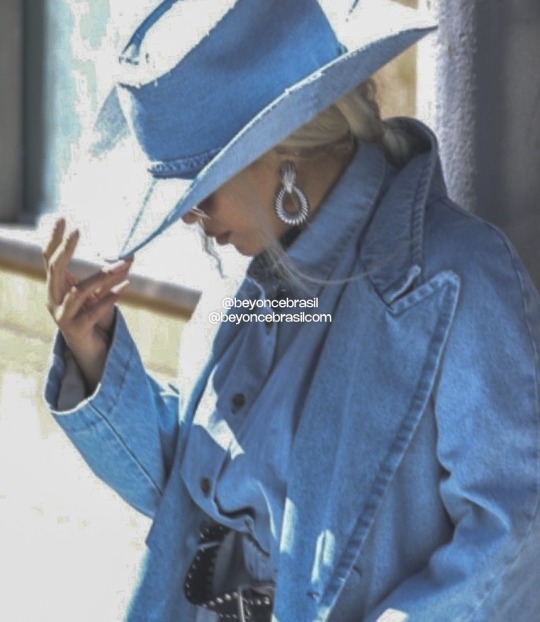
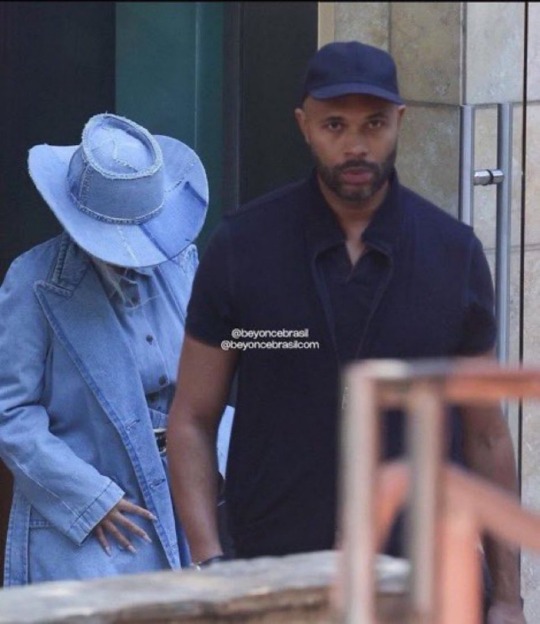

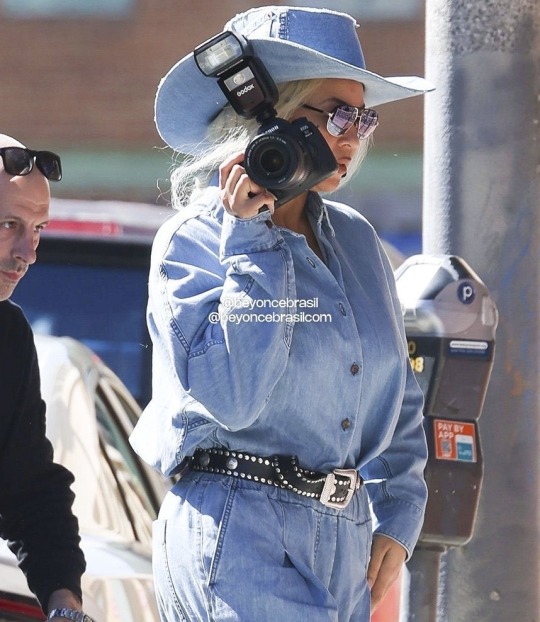
Beyoncé 4.1.24
#beyoncé#beyoncé knowles carter#beyhive#beyonce#beyincé#act ii#cowboy carter#kntry#cuntry#cunty#Julius
20 notes
·
View notes
Text
I am creating a new taglist for my TGC characters (Titus & Gaius)!!!! please comment below if you would like to be added ♥️
TGC-verse Taglist - @chompchompluke @melinskis @connorsui @rhaenattargaryen @sofiyathecunt @fan-goddess @x-prettyboy-x
35 notes
·
View notes
Text
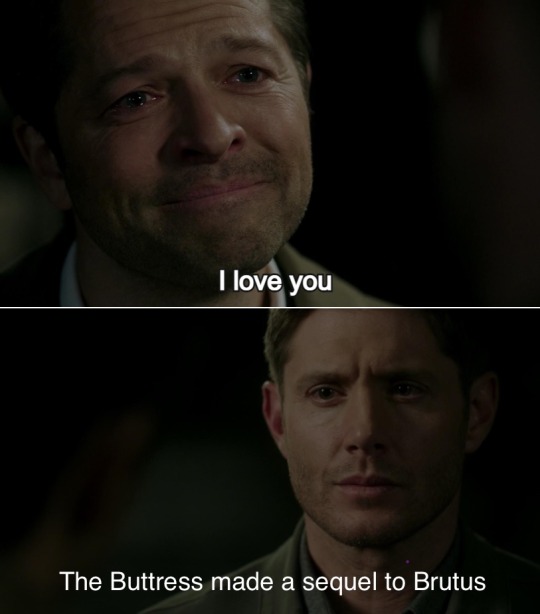
So was anyone gonna tell me the Buttress was dropping the hardest song sequel ever?
#I paused my haitus soley for this meme#I was just on YouTube chilling and they recommend the hardest song sequel#Or maybe it’s just cause I really like Julius Caesar#The buttress#brutus#buttress#Brutus II#Music#songs#The buttresses
81 notes
·
View notes
Text
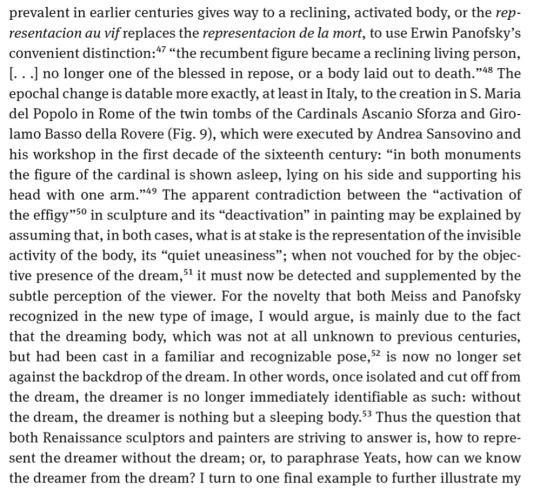
The Art of Dreams: Reflections and Representations
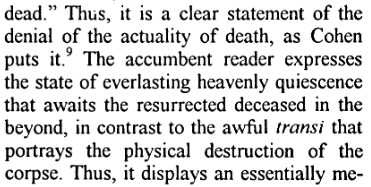

The Tomb of Caterina della Ratta and the Iconography of the Reclining Reader in Renaissance Sepulcharl Art, Yonni Ascher

Ancestor Masks and Aristocratic Power in Roman Culture, Harriet I Flower
okay so just. play connect the dots with me for a second. Girolamo Basso della Rovere is Giuliano della Rovere's (Pope Julius II) cousin. Ascanio Sforza was a long time rival, and later ex-enemy of Giiuliano's. this kind of familial mirroring in the tombs, the way that Ascanio is being subsumed into a matching visual with someone of della Rovere's family is. interesting. because it goes well beyond the expected patron-client relationship between the pope and his cardinals. like, these were companion monuments.
there's also a kind of tragic romantic violence to it, given Ascanio's persistent loyalty to his family and Milan, and Ludovico's plans to have Ascanio's body brought back to Milan in the event of his death and interred in the same chapel as Beatrice d'Este.
#i want to break into the vatican with a seance board and summon della rovere's ghost to ask him if he fucked that vice chancellor#ANYWAY it's probably a good thing i didn't go to a real college and pursue like. renaissance studies or something#can you imagine how insufferable i would be fighting it out. thankfully i just draw comics and i can say things like#i DO think he fucked that vice chancellor. actually.#that said. someday im going to get my hands on a couple of documents and actually start swinging#because i do think that several scholars got something seriously wrong in their assumptions and im about 80% confident in my stance#but im not going to throw rocks at anything until. i can read. the full letters. with my eyeballs.#moving past that im just. oughhhhhhhhhh. the inscriptions too. part of me thinks that della rovere was pulling some julius caesar#bullshit with it. another part of me wonders if della rovere wanted their reconciliation to outlast both of them so he had it immortalized#on ascanio's monument. RIP buddy. that is absolutely not what happened#GOD THIS IS PLAYING 5D chess. julius II named himself after caesar not the previous pope julius#octavian is JC's heir. ascanio does have agrippa parallels but also specifically his name calls to rome's founding. there's a lot! to unpac#or. uh. there could be! s4 borgias should've had della rovere seduce him away from rodrigo
33 notes
·
View notes
Text
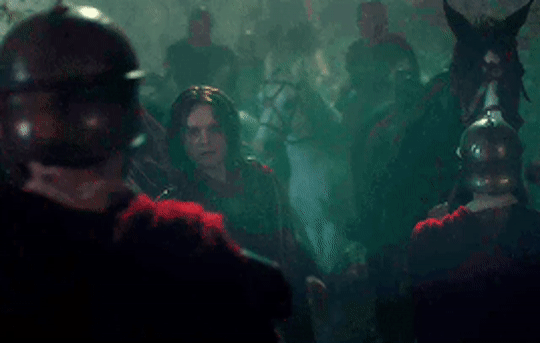
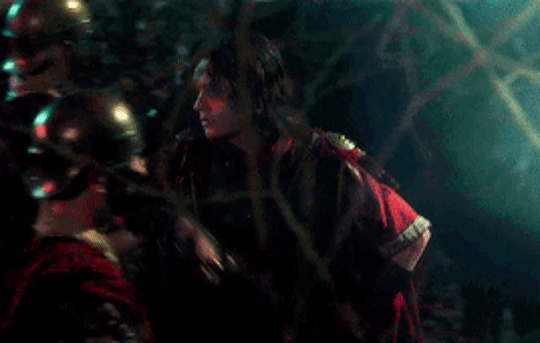
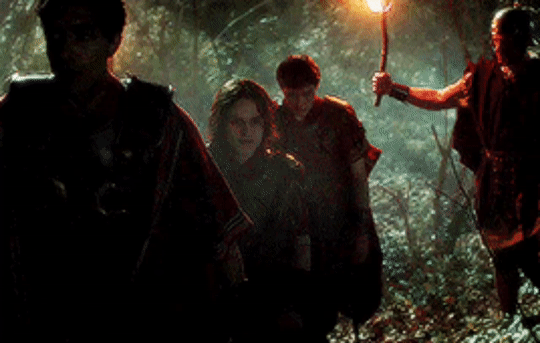
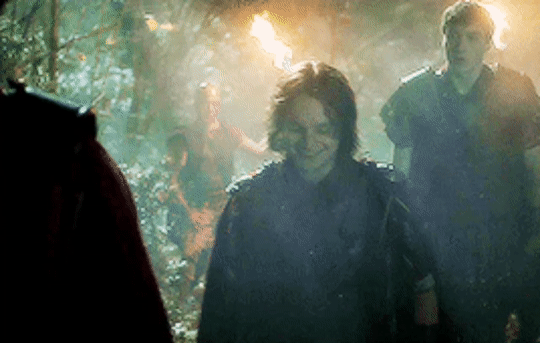
𝐓𝐎𝐌 𝐆𝐋𝐘𝐍𝐍-𝐂𝐀𝐑𝐍𝐄𝐘 𝐚𝐬 𝐲𝐨𝐮𝐧𝐠 𝐆𝐚𝐢𝐮𝐬 𝐉𝐮𝐥𝐢𝐮𝐬 𝐂𝐚𝐞𝐬𝐚𝐫 𝐎𝐜𝐭𝐚𝐯𝐢𝐚𝐧𝐮𝐬 𝐢𝐧 𝐃𝐎𝐌𝐈𝐍𝐀
#aegon targaryen#aegon ii targaryen#house of the dragon#tom glynn carney#gaius julius caesar#c: Gaius Julius Caesar#a: tom glynn-carney
182 notes
·
View notes